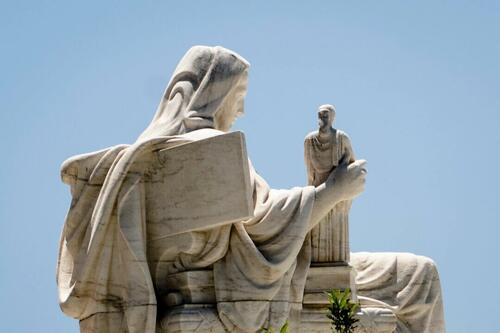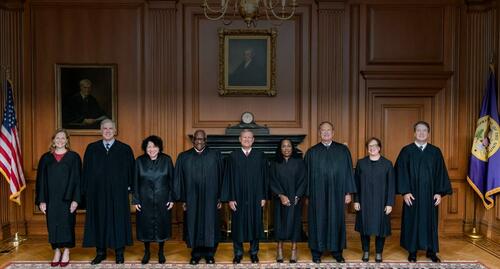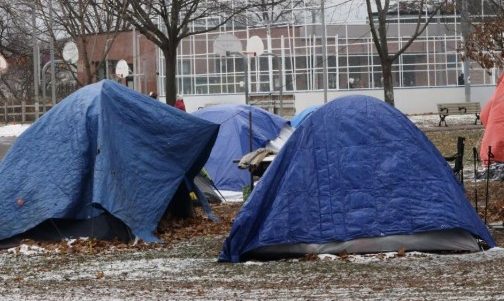
Supreme Court Won’t Hear Student’s Challenge To School Ban On 'Two Genders’ Shirt
Authored by Matthew Vadum via The Epoch Times (emphasis ours),
The U.S. Supreme Court on May 27 declined to accept a student’s challenge to a Massachusetts school’s decision to ban his “there are only two genders” T-shirt.
The court’s decision in L.M. v. Town of Middleborough took the form of an unsigned order. The court did not explain its ruling.
 The Contemplation of Justice statue at the U.S. Supreme Court building in Washington on May 19, 2025. Madalina Vasiliu/The Epoch Times
The Contemplation of Justice statue at the U.S. Supreme Court building in Washington on May 19, 2025. Madalina Vasiliu/The Epoch TimesJustices Clarence Thomas and Samuel Alito dissented, writing that lower courts in the case had distorted the First Amendment to the Constitution.
In the case, a seventh-grade student identified as L.M. donned a T-shirt at Nichols Middle School, a public school in Middleborough, that read, “There are only two genders.” The school principal and a school counselor removed him from class and directed him to take the shirt off.
After the student declined, school officials said that if he didn’t remove the shirt, he could not return to class. He left school and did not attend his classes for the rest of the day, according to a summary by the student’s lawyers at the Alliance for Defending Freedom, a public interest law firm.
L.M. wore the shirt after the public school promoted the idea that “sex and gender are limitless, based on personal identity, and have no biological foundation,” according to his petition filed with the Supreme Court on Oct. 9, 2024.
The school asked students to support this view, but L.M. disagreed and wore his shirt, according to the petition. After the school censored him, L.M. wore another T-shirt that read, “There are [censored] genders,” which was also banned.
The school’s decision was upheld by a federal district court in June 2023, based on the “rights-of-others” school disruption prong of the 1969 Supreme Court ruling in Tinker v. Des Moines Independent Community School District.
The U.S. Court of Appeals for the First Circuit affirmed, even after acknowledging that the shirts in question probably failed the rights-of-others prong, “applying a novel test for ideological speech alleged to demean characteristics of personal identity,” the petition said.
In his dissent, Thomas wrote that Tinker held that public school officials are not allowed to restrict a student’s freedom of speech “unless his behavior ‘materially disrupts classwork or involves substantial disorder or invasion of the rights of others.’”
The holding in Tinker is “without basis in the Constitution” and should be “dispense[d] with … altogether,” he wrote. “But, unless and until this Court revisits it, Tinker is binding precedent that lower courts must faithfully apply,” Thomas added.
In Alito’s dissent, the justice wrote that the First Circuit erred in holding that “the general prohibition against viewpoint-based censorship does not apply to public schools.” In the process, that appeals court “employed a vague, permissive, and jargon-laden rule that departed from the standard” the Supreme Court used in Tinker, he said.
Alito wrote he would grant the petition so that the Supreme Court could “reaffirm the bedrock principle that a school may not engage in viewpoint discrimination when it regulates student speech.”
By limiting the reach of the high court’s viewpoint-discrimination cases, the First Circuit’s ruling “robs a great many students of that core First Amendment protection,” the justice wrote.
School officials had argued in a Jan. 21 brief that the T-shirt ban safeguarded the mental health of students at the school.
School administrators provided evidence of “the severe mental health struggles of transgender and gender-nonconforming students (including suicidal ideation),” of young students at the Nichols Middle School, the brief said.
The school’s policy aimed to protect “gender-nonconforming students who had been bullied in other districts and had harmed themselves or were hospitalized due to contemplated, or attempted, suicide,” the brief said.
Tyler Durden
Tue, 05/27/2025 – 21:45











![Sąd: Jak liczyć zachowek od mieszkania [Wyrok w sprawie wydziedziczonego synka i trójki wnuków]](https://g.infor.pl/p/_files/38265000/podwyzki-38264590.jpg)
![W Goworowie debatowali o bezpieczeństwie. "Dziękujemy wszystkim mieszkańcom" [ZDJĘCIA]](https://www.eostroleka.pl/luba/dane/pliki/zdjecia/2025/275-227256.jpg)

